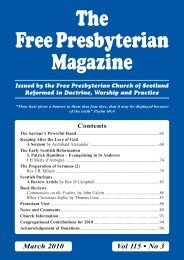December - the Free Presbyterian church of Scotland
December - the Free Presbyterian church of Scotland
December - the Free Presbyterian church of Scotland
- No tags were found...
You also want an ePaper? Increase the reach of your titles
YUMPU automatically turns print PDFs into web optimized ePapers that Google loves.
370The <strong>Free</strong> <strong>Presbyterian</strong> Magazine(2.) Paul uses <strong>the</strong> first person singular throughout. He says, for instance,“I had not known sin”, “I died”, “The commandment which was ordained tolife, I found to be unto death,” “I consent unto <strong>the</strong> law that it is good”, “Idelight in <strong>the</strong> law <strong>of</strong> God after <strong>the</strong> inward man, but I see ano<strong>the</strong>r law in mymembers”. We are bound to understand <strong>the</strong> Apostle to speak <strong>of</strong> himself in<strong>the</strong> use <strong>of</strong> such language, unless <strong>the</strong>re is something in <strong>the</strong> context, or in <strong>the</strong>nature <strong>of</strong> what is said, to render <strong>the</strong> reference to him impossible. It has beenshown, however, that <strong>the</strong> context favours, if it does not absolutely demand,<strong>the</strong> reference <strong>of</strong> what is said to <strong>the</strong> Apostle himself.There is nothing in <strong>the</strong> experience here detailed that is inconsistent with <strong>the</strong>experience <strong>of</strong> <strong>the</strong> true children <strong>of</strong> God. This is evident from <strong>the</strong> fact that<strong>the</strong> same humility, <strong>the</strong> same sense <strong>of</strong> guilt, <strong>the</strong> same consciousness <strong>of</strong> indwellingsin and <strong>the</strong> same conviction <strong>of</strong> helplessness, here expressed, are foundin all <strong>the</strong> penitential portions <strong>of</strong> Scripture. Job, David, Isaiah and Nehemiahmake <strong>the</strong> same confessions and lamentations that <strong>the</strong> Apostle makes here.The same is true <strong>of</strong> believers since <strong>the</strong> coming <strong>of</strong> Christ. There is not one <strong>of</strong><strong>the</strong>m, not even <strong>the</strong> holiest, but is constrained to speak <strong>of</strong> himself as Paul herespeaks, unless indeed he chooses to give <strong>the</strong> language <strong>of</strong> <strong>the</strong> Apostle a meaningwhich it was never intended to express.(3.) While <strong>the</strong> passage contains nothing inconsistent with <strong>the</strong> experience<strong>of</strong> true believers, it is inconsistent with <strong>the</strong> experience <strong>of</strong> unrenewed men.They are not <strong>the</strong> subjects <strong>of</strong> <strong>the</strong> inward conflict here depicted. There indeed<strong>of</strong>ten is a protracted and painful struggle in <strong>the</strong>m, between reason and conscienceon <strong>the</strong> one side, and evil passion on <strong>the</strong> o<strong>the</strong>r. But in <strong>the</strong> unrenewed<strong>the</strong>re is not that utter renunciation <strong>of</strong> self, that looking for help to God inChrist alone, and that delight in <strong>the</strong> law <strong>of</strong> God, <strong>of</strong> which <strong>the</strong> Apostlespeaks here.2. What Romans 7:7-25 teaches. Assuming <strong>the</strong>n that we have in this chapteran account <strong>of</strong> <strong>the</strong> experience <strong>of</strong> a true, and even <strong>of</strong> an advanced, Christian,we learn that (a) <strong>the</strong>re is a mixture <strong>of</strong> good and evil in every Christian; (b) <strong>the</strong>original corruption <strong>of</strong> nature is not entirely removed by regeneration; (c) although<strong>the</strong> believer is made a new creature and is translated from <strong>the</strong> kingdom<strong>of</strong> darkness into <strong>the</strong> kingdom <strong>of</strong> God’s dear Son, he is but partially sanctified;(d) his selfishness, pride, discontent and worldliness still cleave to him andtorment him; (e) <strong>the</strong>y effectually prevent his “doing what he would”, <strong>the</strong>yprevent his living without sin, <strong>the</strong>y prevent his communion with God beingas intimate and uninterrupted as he could and does desire.He finds not only that he is <strong>of</strong>ten, even daily, overcome so as to sin inthought, word and deed, but also that his faith, love, zeal and devotion arenever such as to satisfy his own conscience; much less can <strong>the</strong>y satisfy God.
















